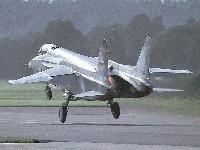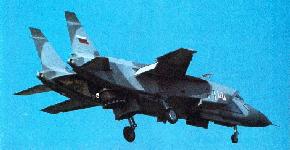





Specifications | |
| Country of Origin | Russia |
| Builder | Yakovlev |
| Role | air defence |
| Similar Aircraft | |
| Span | 33ft 1 1/2in (10.105m); folded, 19ft 4 1/4in (5.9m) |
| wing area | 341.56ft(2) (31.7m(2)) |
| length overall | 60ft 2 3/4in (18.36m) |
| height | 16ft 4 1/4in (5m) |
| wheel track | 9ft lOin (3m) |
| wheel base | 22ft 9 1/4in (6.945m) |
| tailplane span | 19ft 4 1/4in (5.9m) |
| Weights |
25,684lb (11,650kg) Empty, equipped 34,833lb (15,800kg) VTO max take-off weight 42,990lb (19,500kg) STO max take-off weight |
| Loads |
2,204lb (1,OOOkg) VTO max external load 5,732lb (2,600kg) STO max external load 3,858lb (1,750kg) max external fuel |
| Armament |
|
| limiting load factor | 50% fuel, 7g. |
| Accommodation | Single pilot in a Zvezda K36V rocket-boosted zero-zero ejection-seat. |
| Power Plant | plus |
| Max internal fuel capacity | 9,700lb (4,400kg) |
| Maximum Speed |
675 kts (1,250km/hr) Max level speed, sea level 971 kts (1,800km/hr) at 36,089ft (11,OOOm) M=1.8 max achievable Mach number |
| vertical climb rate | 49,213ft/min (250m/sec) |
| service ceiling | over 49,000ft (15,000m+) |
| combat radius |
|
| Cost | |
| User Countries | |


